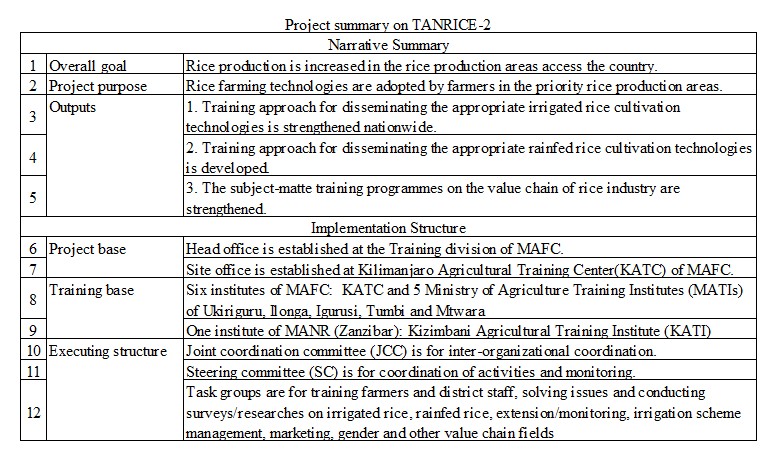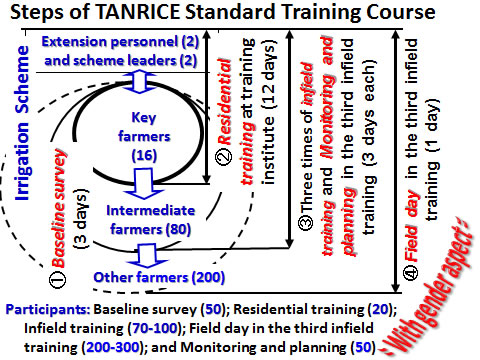Outline of the Project
Project name
Project for Supporting Rice Industry Development in Tanzania (TANRICE-2)
Country
The United Republic of Tanzania
Date of signing R/D
September 19, 2012
Terms of Cooperation
Nov. 16, 2012 to Dec. 31, 2018
Counterpart Organizations
Ministry of Agriculture Food Security and Cooperatives (MAFC)
Ministry of Agriculture and Natural Resources (MANR) of Zanzibar
Target Areas
Priority rice production areas across the country
Target Group
More than 36,000 farmers in the target areas
Background of the Project
In order to promote and establish irrigated rice cultivation techniques, the Japan International Cooperation Agency (JICA) has carried out a total six technical cooperation projects in Tanzania since 1974. Five out of the six projects were carried out at the Kilimanjaro Agricultural Training Center (KATC). During the latest completed project called "Technical Cooperation in Supporting Service Delivery Systems of Irrigated Agriculture," (hereinafter referred to as "TANRICE-1"), the training approach to extend these techniques through farmers was implemented. TANRICE-1 conducted two different types of trainings: standard training that transferred broad technologies in cultivation to irrigated small-scale rice farmers and the subject-matter trainings (SMTs) that concentrated on specific topics such as irrigation scheme management, marketing and gender. As a result, it achieved productivity improvements for 44 irrigation schemes and technology dissemination to 5,255 farmers.
However, there are still several issues to extend rice production technologies over the country in order to meet the Government of Tanzania (GoT) policy target of 2 million tons per annum of rice production by 2018. These issues include among others, revising the extension techniques, more capacity development on rice production technology for Ministry of Agriculture Food Security and Cooperatives (MAFC) staff, reinforcement of networks among related organizations and improvements of training contents. Since rice is cultivated not only in irrigated land but also in rainfed upland and rainfed lowland ecosystems, it is essential for appropriate rice cultivation technologies of these lands to be developed and disseminated.
In order to promote further extension for rice productivity increase in the country, the Government of Tanzania (GoT) requested TANRICE-2, and JICA started TANRICE-2 on November 16, 2012.
Framework of the Project

The Project Approach to Dissemination
Since the main theme of TANRICE-2 is dissemination of rice production technologies, three approaches are suggested in the Project design.
- Training based-extension approach adopted from TANRICE-1: The training-based extension approach is called "Standard Training Course" disseminating rice production technologies by cascading technology transfer from extension officers and key farmers (KFs) to intermediate farmers (IFs), and IFs to other farmers (OFs) through four steps of training as shown below.

- Cost-effective approach by adopting "Modified Standard Training Course": In order to increase number of training courses, shorter period and lower cost training versions are added to the standard training course focusing on the more effective components/techniques of the training course. This new course is called “Modified Standard Training Course."
- Enhanced farmer-to-farmer (FTF) extension approach: In order to enhance FTF extension from KFs/IFs to OFs, several measures are suggested such as conducting training courses for extension officers to support the FTF, providing new extension-effective SMT courses, applying effective extension materials (posters, flipcharts, etc.), etc.
- About JICA
- News & Features
- Countries & Regions
- Our Work
- Thematic Issues
- Types of Assistance
- Partnerships with Other Development Partners
- Climate Change / Environmental and Social Considerations
- Evaluations
- Compliance and Anti-corruption
- Science and Technology Cooperation on Global Issues
- Research
- JICA Development Studies Program / JICA Chair
- Support for the Acceptance of Foreign HRs / Multicultural and Inclusive Community
- Publications
- Investor Relations
